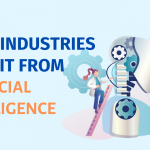Ever since the Industrial Revolution 4.0 has exploded, the development of such emerging technologies like AI, ML, and Big Data have been concerned more than ever. One of those hottest buzz words is Artificial Intelligence which is changing how companies do business.
According to Tractica, a research firm, the global AI software market should reach $ 118.6 billion in annual worldwide revenue by 2025. It further says that more than 300 AI use cases will contribute significantly to the market growth.
What is Artificial Intelligence
Artificial Intelligence (AI) is a combination of algorithms formulated to create machines that have the same skills as a human being. It can replicate “human” behaviors such as learning and problem-solving. Artificial intelligence already allows machines to complete various “human” tasks, from driving automobiles and reacting to their environment, to providing virtual assistance to playing games. Robots are already used widely in numerous industries and are projected to spread throughout the consumer market in the next few years.
AI is the ability of a machine to display human-like capabilities such as reasoning, learning, planning, and creativity.
AI enables technical systems to perceive their environment, deal with what they perceive, solve problems, and act to achieve a specific goal. The computer receives data – already prepared or gathered through its sensors such as a camera – processes it and responds.
AI systems are capable of adapting their behavior to a certain degree by analyzing the effects of previous actions and working autonomously.
Why is Artificial Intelligence important?
Some AI technologies have been around for more than 50 years, but advances in computing power, the availability of enormous quantities of data, and new algorithms have led to major AI breakthroughs in recent years.
Artificial intelligence is seen as central to the digital transformation of society and it has become a priority in the Industrial Revolution 4.0
Thanks to AI, almost every industry is leveraging the benefit of the technology but there are the top 5 industries that have the highest potential for AI applications.
For more positive impacts that Artificial Intelligence place on businesses, lets read the article: Top advantages of Artificial Intelligence
Top 5 Industries benefit from Artificial Intelligence
1. Artificial Intelligence in Healthcare
This is one area that tops the list when it comes to the extent of AI application. AI in healthcare is used in many areas but the following tops the chart:
- Patient Data Analytics:
Analyze patient and/or 3rd party data to discover insights and suggest actions. Greater accuracy by assisted diagnostics. Lower the mortality rates and increase patient satisfaction by using all the diagnostic data available to detect the underlying reasons for the symptoms.
- Personalized Medications and Care:
Find the best treatment plans according to patient data. Provide custom-tailored solutions for patients. By using their medical history, genetic profile, the hospital can create a custom medication or care plan.
- Digital consultation
Most young people in the typical 9-5 schedule may not be able to visit a doctor. With the rise in smartphones and other devices, digital health consultation tools have surged in popularity especially in the age group of 18-29.
- Digital management
AI is used in digitizing data documentation. Applications for digital patient onboarding assist in getting digital information at the first step so that sorting and storing in digital form is more time-saving and labor-saving. Thereby hospitals can get rid of stacks of folders with decades of health records kept in file cabinets in clinics or hospitals.
2. Artificial Intelligence in Retail and E-commerce
With every incomplete sale due to cart abandonment e-commerce firms tend to lose almost 70 percent in revenue resulting in millions of dollars each day. AI is alleviating the issue and increase effectiveness
- Forecast of sale
AI-based tools benefit the e-commerce companies by way of automating data, stock, and inventory analysis that facilitates better forecasting of sales.
- Induce a purchase on abandoned carts
AI-based chatbots can remind customers with incomplete sales and abandoned carts with offers and discounts in order to induce a purchase.
- Digital consultation
On any given day, your potential customer would like instant assistance on any issue which may not be answered in the FAQ sections. In order to prevent the customer from fleeing the site, the AI-based chatbot with NLP (natural language processing) can assist your customer instantly.
3. Artificial Intelligence in Financial markets and services
An estimated 45% of the companies have invested more than $5 million in AI-related initiatives. This itself speaks volumes that the followers and startups in the finance industry are also getting in the race.
- Online onboarding
Banks and Financial firms are leveraging AI with eKYC. The technology allows the companies to verify and authenticate customers so that they are enabled to do online onboarding. It can enhance the new account opening rate and save cost
- Fraud Detection:
Leverage machine learning to detect fraudulent and abnormal financial behavior, and/or use AI to improve general regulatory compliance matters and workflows. Lower the operational costs by limiting the exposure to fraudulent documents.
- Insurance & InsurTech:
Leverage machine learning to quote optimal prices, manage claims effectively and improve customer satisfaction while reducing costs. Detect your customer’s risk profile and provide the right plan.
- Financial Analytics Platform:
Leverage machine learning, Natural Language Processing, and other AI techniques for financial analysis, algorithmic trading, and other investment strategies or tools.
- Credit Lending & Scoring:
Use AI for robust credit lending applications. Use predictive models to uncover potentially non-performing loans and act. See the potential credit scores of your customers before they apply for a loan and provide custom-tailored plans.
4. Artificial Intelligence in Logistics
AI in logistics holds the potential to drastically change operations. Predictive analytics can accurately predict the inventory required by a vendor and optimize routes to minimize overhead costs.
- Predict the requirements of storage a certain product
Ab InBev, the worldwide distributor for beverages like Budweiser and Corona, has used AI to optimize logistics to a great extent. Using predictive analytics, the organization was not only able to brew the optimal amount of each beverage, but also accurately predict the demand of a certain product. This allowed them to cut down the warehousing expenses and overhead costs significantly.
- Accelerate documenting at customs stations
Shipping companies also stand to benefit greatly from implementing AI. Usually, document checks at customs stations hold up the shipping process. Today, it takes multiple working days for a ship to get clearance to ship all its goods. Image recognition algorithms and intelligent automation can help customs officials conduct checks more seamlessly by scanning the documents involved, transitioning it into a digital realm.
- Keep track of shipments
This data can then be used to accurately keep track of shipments while cutting down on time spent at ports. Due to the technology’s benefits, the worldwide shipping industry has also adopted AI, especially predictive analytics, to optimize supply chain economics.
5. Artificial Intelligence in Transportation and Traffic
Transportation and Traffic
As AI disrupts several industries, its impact is also being felt in the transport sector. The greatest challenge the industry has faced over the years has been modeling according to a predictable pattern. Unpredictable traffic, accidents, and human errors have made it challenging to create models that can help solve traffic problems.
- Predict events
With the integration of artificial intelligence in transport, it is now easy to predict events using available data. The models developed from the data are proving fruitful in traffic management, thereby minimizing accidents and easing traffic in cities.
- Autonomous vehicle
One of the most revolutionary applications of AI in transport is the autonomous vehicle. Though we were skeptical of the technology at its formative stages, it has now become a reality. Driverless taxis are currently operating in Tokyo, and they look promising in terms of reducing the costs of cab services.
Similarly, The US logistics sector is also embracing autonomous trucks. With trucks transporting 65 percent of goods globally, we are likely to see changes in how transport and logistics will change. Specifically, costs will likely come down, making it cheaper to use road transport for logistics.
- Predict flight delays
In aviation, one of the greatest problems we often experience when we want to fly is flight delays. Airlines are always late to provide alerts on impending flight delays, causing us a lot of inconveniences. In 2018, Google began using machine learning and historical data to forecast flight delays. Future innovations will be useful in forecasting weather patterns and use them with available airline data to predict flight delays.
—————————————————————————
In this Revolution of Industrial 4.0, AI has impacted businesses significantly. The sooner businesses apply and leverage from AI, the sooner they can enhance their competitiveness on the market.
Realized the rapid development of Artificial Intelligence, TPS Software put the effort into research and development of the emerging technology and presented its first AI solution: Joy ID – Hospital: AI solution for the electronic patient onboarding, which recently got into the final stage of the AI Solution Contest organized by the Department of Information and Technology Ho Chi Minh City. Besides, the company is in the process of accomplishing two other AI Solutions: Joy ID – eKYC and Joy ID – Office.
For more insights on AI, contact TPS Software to have free consultancy.













